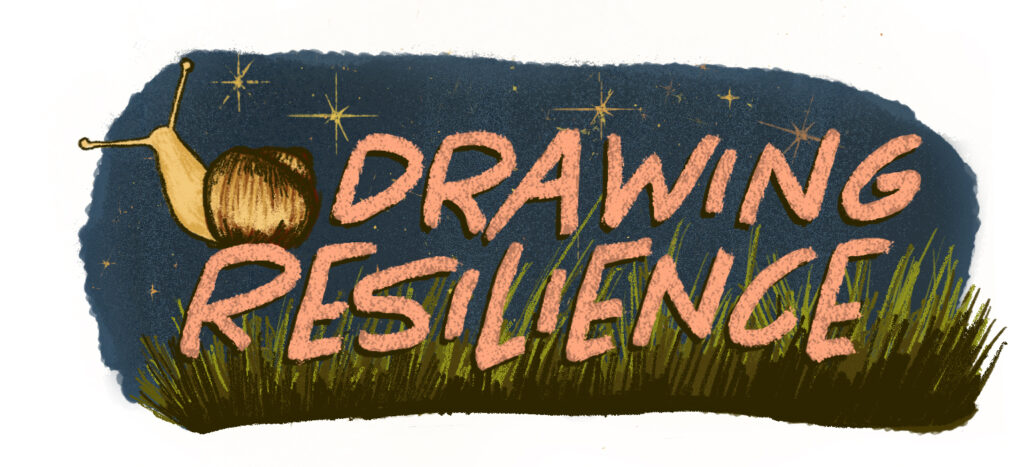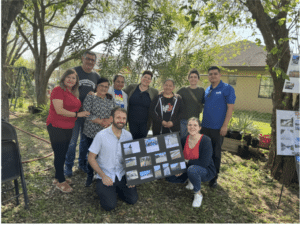
Drawing Resilience: Chris Clayton

Illustrations and interview by Nhatt Nichols
Chris Clayton is the agricultural policy editor at DTN/The Progressive Farmer. He’s also the author of The Elephant in the Cornfield: The Politics of Agriculture and Climate Change, which describes in detail how farmers and farm lobbyists have dealt with a changing climate. (Register for an upcoming livestream with Chris and other rural ag journalists below!)
Nhatt:
What do you think journalism’s role is in resilience?
Chris Clayton:
We are dealing with more conflict in rural areas over renewable energy issues. As you look at the policies implemented regarding climate change and renewable energy, you’re getting more pushback on some of these efforts, whether wind, solar farms, or carbon pipelines.
Nhatt:
I’m surprised by that; I feel more people understand what’s at stake.
Chris Clayton:
The county I live in is battling over a wind farm that a big utility in Iowa wants to install.
You wouldn’t know it if you didn’t live in Iowa, but we have one of the biggest data server industries in the country. Google’s largest data server is about 15 miles from where I live, and the only reason Google wants to come to Iowa is that roughly 40% of our power comes from wind.
Well, it hasn’t affected anybody in our county until now, when we have a new farm wind farm coming in. Now we’re hearing every complaint in the world about why this wind farm shouldn’t be developed; even though we didn’t have any problems with wind energy before, it’s been a great economic driver in our area.
Nhatt:
As a journalist reporting on renewable energy, are you helping inform people who are worried about the way we’re harvesting energy?
Chris Clayton:
I started writing about climate change when they passed the renewable fuel standard in 2005. Living in the Midwest, I’d never seen anything that was such a huge economic driver. We saw an explosion of agriculture in small rural towns with ethanol plants, and when the 2008 recession happened, we didn’t see a big crash in employment because we were buoyed by renewable energy.
That was eye-opening that these green policies can benefit rural areas and landowners. There’s a lot of criticism over the biofuel and wind policies, but if you diversify your energy portfolio, you’re spreading the impact out over a large area. It’s different than one giant coal plant in one place in one location; you have hundreds of wind turbines across the landscape. That’s hundreds of landowners that are making money getting paid to do that.
Nhatt:
A big topic of conversation is how to support carbon sequestration. That’s another way a farm can bolster its resiliency with money by doing something right for the environment.
Chris Clayton:
I don’t think we do a good job reporting on carbon sequestration. Average people need help understanding carbon because it’s incredibly technical. But they know that there are issues with water quality and that the problems are growing, whether it’s nitrogen, phosphorus, or pesticides, in the water. The practice of sequestering carbon in the soil is virtually identical to those you would put in place to reduce water runoff from your farm.
Nhatt:
That feels important, with drinkable water disappearing in a lot of places.
Chris Clayton:
We’ve had water quality fights up and down the Midwest and water quality and quantity issues. A big challenge of climate change is hydrology.
Nhatt:
Does the work that you’re doing help change conversations and highlight essential things?
Chris Clayton:
The conversation has changed over time, but I can’t take any credit for that. People I write for don’t care what Chris Clayton has to say. But when they hear a rancher and farmer from Oklahoma like Jimmy Emmons, they hear these farmers talk about the things that they’ve been doing on their farms that are different, that are improving soil, that are reducing their input costs. They become far more engaged with what these guys are doing.
Nhatt:
The job of journalists is to provide a platform, so the fact that you’re writing about farmers in Oklahoma and a farmer in Colorado will read it is helpful. Information sharing is helpful.
Chris Clayton:
Climate and the future of food production and agriculture in rural America is complicated. Some farmers perceive everything they hear about climate change as an attack on agriculture, that they’re being personally criticized over emissions. It’s complicated because there are a billion people on the planet, and the one thing everybody has to do is eat. When it comes to carbon emissions, agriculture deserves a little more pathos than some other industries, simply because we have to find a way to provide stable quality food for everybody.
Register
Join Chris Clayton and other ag journalists on March 21 at 2 p.m EST at Unpacking Food and Ag Reporting | Rural Journalism Collective, a livestream discussion presented by the Daily Yonder and Rural Assembly.
Learn more and register to join the conversation.
Join us
Drawing Resilience features interviews with leaders who are doing the hard work of staying in—staying in the work, in relationship, in community, even amid deep divisions, systemic injustices, and social and economic challenges—and inspiring others along the way. Do you know someone we should feature? Let us know.
Get this and other rural content in your inbox with the Rural Assembly newsletter.
Drawing Resilience: Chris Clayton
Chris Clayton is the agricultural policy editor at DTN/The Progressive Farmer. He’s also the author of The Elephant in…
Read More








